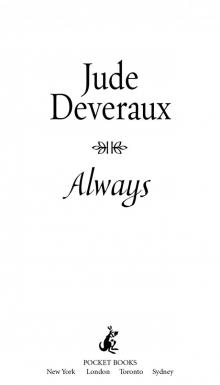- Home
- Jude Deveraux
Remembrance Page 40
Remembrance Read online
Page 40
He loved Catherine, loved her with all his heart. Four and a half years ago he had seen her at a garden party at his aunt’s house. He had taken one look into those blue eyes, one look at that white-blonde hair and he was lost. Never since had he cared about any woman other than her.
But things had gone wrong on their wedding night. Very wrong. Very, very wrong. As much as he wanted her, he couldn’t make her his. Catherine had been so innocent that she’d not known there was anything wrong. She had loved the way he’d caressed her naked body, loved the way he held her. After hours of touching and kissing, she had not understood why her husband had slammed out of the room in a rage. He knew that Catherine felt that she had done something wrong, but she had no idea what.
The next morning he’d told himself that his inability had been due to wanting her so much, loving her so much that he was in pain. And it was due to the unfamiliarity of her. Perhaps if they knew each other better he could relax around her.
So he had spent time with her, traveled with her, laughed with her, confided in her, but all that did was make him need her, make him love her more than he had when he’d first married her.
He wanted her so much. He ached with wanting her. Everything about her enticed him: the way she walked, how she spoke, what she spoke of. The way she held a teacup made sweat roll down the back of his collar.
After a year of living near her and being unable to consummate the marriage, he knew he had to get away from her, so he began to travel, began to stay away from her, hoping that not seeing her every day would free him from what he felt for her.
And there were other women. He had to prove to himself that he was still a man. He left Catherine in the country and spent his time in London, drinking and seducing women. Never did he have any problem with any of them. Only Catherine made him feel less than a man.
Somewhere during the three years of their marriage—if it could be called such—he’d started to tell himself that their problem was her fault, not his. There was obviously nothing wrong with him, so it must be her.
His Uncle Hubert had been concerned about Tavistock spending so much time away from Catherine. “Women get into mischief when they have no one to occupy their time,” he’d said. “You should give her a few children to take care of. Keep her busy in bed.” He had not understood Tavistock’s angry reply and subsequent storming out of the house.
When Tavistock had seen the way Catherine reacted to the lovely Fiona, Catherine’s jealousy had touched something deep within him. He didn’t like himself much for it, but he wanted to hurt Catherine, just as she was innocently hurting him. He’d begun to mention Fiona at every opportunity. He told Catherine of Fiona’s perfume, of her clothes. He suggested that Catherine ask Fiona how she made her hair so soft. With every word he spoke, he saw Catherine grow more and more angry, until, at last, her anger matched Tavistock’s.
But everything backfired when Catherine wrote those letters. He knew very well that she’d never had sexual relations with any man, not him or anyone else. She was too closely looked after for that. Whenever Tavistock returned from a trip, he called her maid to him and asked for a full report on every minute of Catherine’s doings. Her greatest pleasures seemed to be in patronizing opera singers and buying pretty little ornaments from some Russian émigré.
Tavistock knew very well that she had written those letters to make him think she was desirable. She’d never say so, since she was as proud as any man, but he knew what she was after. Catherine wanted him to realize that other men did like her and want her, just as he seemed to want Fiona.
But Tavistock had some pride of his own, and he couldn’t very well explain to Catherine that the problem was him and not her.
Everything would have blown over if it hadn’t been for Aya, his old nanny. She had always been very possessive of her charge. When Tavistock was a child she used to pinch him to make him cry before she presented him for the obligatory 6 P.M. visit to his parents. It didn’t take too many appointments before the visits were suspended; his parents did not want to be bothered with a screaming, runny-nosed brat in the drawing room every evening. When his parents instructed the nanny to bring the child back when he was old enough to have learned some manners, Aya had what she wanted. Her sweet little Tavey was hers alone.
For all that Tavistock could fool other people into thinking that his little wife bored him too much to remain at home, Aya knew the truth. She knew that Tavistock was obsessed with Catherine. From the moment he had first seen Catherine, he had thought of no one else. Only she was on his mind. Aya knew that Catherine had stolen Tavistock from her in a way that only deep love could, and this made her hate Catherine.
Tavistock pretended that he didn’t know how Catherine’s letters became known to the public, but he did. In a naively clumsy way, Catherine had “accidentally” left the letters lying about so he could find them. Truthfully, he had enjoyed reading them, as he always enjoyed her stories. Catherine could go to the most boring, ordinary function in the world and come away with truly hilarious stories. When they were first married he would sit through a tea party with some old crone pouring tea and talking endlessly about her garden. It would be all he could do to keep from nodding off. But later, when he and Catherine were driving home, she would entertain him with her accounts of all sorts of subtle things that had happened during the tea party. Catherine told of big-nosed, bony daughters who were dying of love for him. Her “proof” was the way the girl had handed Tavistock a teacup and the way she had asked if he wanted milk or lemon. When Catherine described the gathering to him, Tavistock always felt that he had attended a different party than she had. Where had he been when all this happened? He came to look forward to what Catherine told him had happened much more than what did happen.
But after the first year of their marriage, when Tavistock’s anger had gradually increased, Catherine had stopped telling her stories. She’d said, “When I am unhappy, there are no stories in my head.” After that he’d started traveling and staying away from her.
But he always came back to her. He missed her so much when he was away. When he was away from her he felt that part of him was absent, as though he’d left part of his body or his mind in another place.
So why could he not perform in bed with her? He had no idea, but no matter what he tried, nothing happened between them.
So Catherine had tried to get his attention by writing letters that said she’d been seduced by every man in England. Tavistock had read the letters and laughed, but then Aya mailed two of the letters to the newspapers, and that had stopped the laughter. She mailed some of them to the wives of the men with whom Catherine said she’d had torrid affairs. She sent others to the men whose names were at the top of the letters.
Tavistock didn’t know who was worse, himself or the men who knew that they’d never touched Lord de Grey’s pretty little wife. Each man liked for others to think that he had cuckolded the man who often made their wives weak-kneed with lust. There wasn’t a man in the salons of England who hadn’t heard a wife or mistress mention the beauty of Adam Tavistock, or the virility he exuded when he walked across a room. Not one man hadn’t heard how Lord de Grey looked at his little wife so hotly her hair might catch fire, and why didn’t her husband look at her like that?
The letters gave these men an opportunity to get back their own. Often, they denied having touched the pretty little blonde, but they all said the words in a way that actually said they were lying, that they were being noble and trying to save the woman’s honor.
So what did Tavistock do to save his own honor? Did he remain married to Catherine, unable to make love to his own wife? He would rather like to have children. He’d like to have a son to carry on his name, then he’d like to have some girls who looked just like Catherine. Girls to tell him stories and look at him as their mother did. The only thing he could think of that would be better than having Catherine would be to have half a dozen Catherines.
But that wasn’t
going to happen. He was never going to have children with her.
Coldly, after the letters were sent, he had made the decision to divorce her. And who better to marry than the lovely Fiona? Appearing with such a beautiful woman on his arm would show the world that he was still a man, even though his wife had humiliated him in front of that world.
But every time Tavistock thought of marriage to Fiona, he felt sick. He wanted Catherine. Wanted her with all his being. But he couldn’t take her.
The horse, tired now, stumbled again, but Tavistock kept pushing the animal. He had ridden this way many times and he knew the way well. Soon he would come to the road, then turn and start back to the house; he had reached the end of his property.
Catherine, he thought. Catherine, Catherine, Catherine. What could he do with her? What would he do without her?
He thought he would die when the doctor had told him that Catherine had fainted twice and he felt sure that she was in the family way. “Find out,” Tavistock had snapped, then drunk half a bottle of brandy while he waited for the doctor to return.
When the doctor told Tavistock that his wife was still a virgin, the look on the man’s face was all Tavistock needed to see to know how the outside world would view him if this information became common knowledge.
When Tavistock had confronted Catherine with knowledge of her virginity, she had shouted at him in a way she’d never done before. In fact, in the last few days she had been different. Not so frightened. Not so shy. She didn’t look at him with eyes that begged him to be nice to her, to pay attention to her, to love her. She didn’t seem to be asking, What did I do wrong? Why don’t you love me?
He didn’t think it could be possible, but he seemed to love this Catherine more even than he did the other one. Maybe his inability with her stemmed from her goodness and her innocence. Maybe he thought he was soiling her by committing such a carnal act as lovemaking.
Even to his own ears, he knew that was a pile of cow manure. The truth was, he had no idea what was wrong with him.
He was so deep in thought that when he came to the pile of logs and rocks in the road and his horse balked, he hadn’t the presence of mind to catch himself but instead went sailing over the head of the animal, landing on his back on the hard ground.
It took a moment to clear his head from the fall. Dazed, he sat up on his elbows just in time to see his horse disappear over the ridge toward the house. The animal knew the way home well, since this was the spot where he always turned, here at the edge of his land.
“Damnation,” he said, trying to stand but finding himself so dizzy he almost fell again. Stumbling a couple of times, he made his way to the pile of brush and rocks, thinking that he’d have the hide of the person who did this. Why would anyone put a four-foot-high pile of rubble in the middle of a road that is used every day? he thought. Someone could be—
He didn’t think anymore because he heard a sound, a zzzzzt that piqued his curiosity. Leaning over the largest log, he looked toward the source of the sound. He saw a tiny bit of light, a fuse that had been lit and was burning toward a cylinder that seemed to be leaking gray powder.
“Gunpowder,” he said aloud, then turned away just before there was a burst of light and an explosion that almost deafened him. A flying rock hit the back of his head and he remembered nothing after that.
“Where am I?”
“Hush,” a woman’s voice said in an accent he didn’t recognize, but it sounded decidedly uneducated. “You just rest now and I’ll take care of you.”
It was pitch dark in the room and he could see nothing; his head hurt so much he thought death might be the only way to end the pain, and there was a roaring in his ears.
“No! Keep your hands off the bandage,” the woman said. At least that’s what he thought she said. It sounded more like, “Keep yore hans off’n the bandin’s.”
Tavistock was too tired to try to figure out what was going on as he dropped his hands to his side. “Am I blind?” Blindness would seem to be a suitable ending to his worthless life.
“Just a little explosion, is all. A bit of gunpowder, that’s all. Nothin’ to worry yore little self about. Here, honey, you jist drink this and you’ll feel better.”
The bandage was tight about Tavistock’s eyes as she lifted his head, her arm under his neck, the side of his face pressed into her soft bosom as he drank the warm liquid from the rough, thick cup. “What is it?” he asked dreamily, for he rather liked his face against her breasts. She didn’t seem to have bothered with a corset.
“Willow bark tea,” she answered, “the precursor of aspirin, laced with some dark rum.” She mumbled something about not knowing if aspirin had been invented yet.
That statement should have engendered some questions in his mind but he couldn’t seem to think what they were. “Who are you?” he whispered.
“Your guardian angel, honey,” she answered. “Who would you like for me to be?”
“I can’t think that I’d want you to be anything other than what you are,” he said as he ran a hand up her arm.
Abruptly, the woman dropped his head on the hard bed, making sparks of light fly through Tavistock’s head and eliciting a groan from him.
“Don’t you have a wife?” she asked and there was anger in her voice. “Don’t you have a wife who spends a lot of time alone while you go tomcatting around the world?”
Her slang was unfamiliar to him, but he understood the gist of what she was saying. “She doesn’t—”
“So help me, if you tell me she doesn’t understand you, I’ll hit you with a poker.”
At that Tavistock laughed. “I’m afraid she understands me too well. May I have more of that drink of yours?”
This time she did not hold his head but held out the cup to him at arm’s length. In his blindness, he had to flail his hands around to find the cup.
When the woman was silent, he listened to hear where she was, but the roar in his ears was too loud to hear anything clearly. Something about her intrigued him. “How did I get here? Please, you must tell me everything.”
“I brung you,” she said in her odious accent, but he was disliking it less with each swallow he took of the warm liquid in the cup.
“No,” she said softly, and he felt the hard cot move as she sat beside him, “you tell me all about yourself. Why was you ridin’ that pore horse so hard? You nearly killed it.”
He gave a snort of laughter that made his head hurt, but the pain was easing with the help of the magic elixir in the cup. “If I started to tell you the problems of my life I’d never stop.”
“I am a good listener,” she said softly, forgetting to speak in the exaggerated accent she had been affecting. Tavistock didn’t seem to notice.
There was something about the strangeness of the situation, his blindness, the warm room, the softness of the woman in spite of her attempt at coolness, that made Tavistock want to talk. “Have you ever loved anyone so much that nothing else in life mattered? Loved someone so much that you couldn’t eat or sleep or work?”
“Yes,” she answered and he could tell from her voice that she did know. “The person is your reason for living.”
“Yes, she is.”
“Ah,” the woman said. “Your Lady Fiona.”
Tavistock smiled into the darkness that surrounded him. “Fiona. She is nothing. An empty shell. I own pieces of jade with more soul than she has.”
“Then who?” the woman whispered. “Surely not your wife. It is common knowledge that you plan to divorce her.”
“Yes, I love her and only her.”
“Then why…”
“I must,” he said fiercely, which made his head hurt. “I must. I must. I—”
“Ssssh,” she said and again pulled his head to her breast, but this time she stretched out beside him. To his shock, Tavistock felt her slim bare legs next to his. “What is wrong?” she whispered into his ear, and her soft voice combined with the roar that was there made her voice seem f
ar away and not real.
“I cannot make her mine,” he said, knowing that he’d never said the words to any other person in his life.
“Cannot…,” she said, moving her hips against his side, her lips on his ear.
In the last few years he’d been to bed with several women, some of them renowned for their expertise in lovemaking, but he’d never felt the flush of excitement that this woman was sending through him.
“You seem like you could do anything you wanted to do,” she practically purred as she rolled off the bed.
Tavistock had no idea what his hesitation was, but there was something holding him back from taking this woman. Abruptly, with a quick gesture, he tore off his blindfold. For a moment he could see nothing and for a moment’s panic, he thought he truly was blind. But then he had a vague impression of a one-room cottage, a tiny fire in a brazier in one corner. Little furniture and that of the simplest, crudest sort. Outside the one window the darkness of night, the oak door heavily bolted.
As Tavistock’s vision began to clear, he saw her standing to one side, legs spread wide apart, hands on her hips in a truly provocative pose. His vision was fuzzy, blurred even as he wiped his hands in front of his eyes. She had on a red blouse that barely covered her breasts, a wide red and black sash at her tiny waist, then a full black skirt that was pinned up high on one thigh, exposing one bare leg.
“Will I do?” she asked insolently, her red lips drawing back in a smile that made chill bumps rise on his skin.
Part of him told himself that he should not touch her, that she probably had a husband lurking in the shadows and she planned to seduce him, then blackmail him for all she could get. He didn’t like dealing with women like…like her, but there was something about this one that he found irresistible. No doubt his attraction to her was because he couldn’t see very well, heard things as though they were at a distance, and—

 Eternity
Eternity The Temptress
The Temptress The Taming
The Taming True Love
True Love Forever...
Forever... Lavender Morning
Lavender Morning The Velvet Promise
The Velvet Promise Days of Gold
Days of Gold Temptation
Temptation Counterfeit Lady
Counterfeit Lady Twin of Fire
Twin of Fire Remembrance
Remembrance Velvet Angel
Velvet Angel The Enchanted Land
The Enchanted Land Just Curious
Just Curious Wild Orchids
Wild Orchids First Impressions
First Impressions Wishes
Wishes Twin of Ice
Twin of Ice Ever After
Ever After An Angel for Emily
An Angel for Emily River Lady
River Lady The Invitation
The Invitation Scarlet Nights
Scarlet Nights The Black Lyon
The Black Lyon High Tide
High Tide The Girl From Summer Hill
The Girl From Summer Hill Sweetbriar
Sweetbriar As You Wish
As You Wish For All Time
For All Time Secrets
Secrets The Blessing
The Blessing Upon a Midnight Clear
Upon a Midnight Clear The Mulberry Tree
The Mulberry Tree The Scent of Jasmine
The Scent of Jasmine Sweet Liar
Sweet Liar Carolina Isle
Carolina Isle Holly
Holly A Knight in Shining Armor
A Knight in Shining Armor Always
Always The Duchess
The Duchess Forever and Always
Forever and Always The Raider
The Raider The Conquest
The Conquest Moonlight in the Morning
Moonlight in the Morning The Heiress
The Heiress Stranger in the Moonlight
Stranger in the Moonlight Moonlight Masquerade
Moonlight Masquerade Change of Heart
Change of Heart The Awakening
The Awakening Velvet Song
Velvet Song Someone to Love
Someone to Love The Summerhouse
The Summerhouse The Princess
The Princess Highland Velvet
Highland Velvet A Forgotten Murder
A Forgotten Murder Lost Lady
Lost Lady Met Her Match
Met Her Match LEGEND
LEGEND Forever: A Novel of Good and Evil, Love and Hope
Forever: A Novel of Good and Evil, Love and Hope Scarlet Nights: An Edilean Novel
Scarlet Nights: An Edilean Novel